- Home
- Carolyn Keene
078 The Phantom Of Venice
078 The Phantom Of Venice Read online
Contents
* * *
1 Mid-Air Meeting
2 A Shot in the Dark
3 The Watcher in the Shadows
4 Falcon Palace
5 A Glass Menagerie
6 Unseen Eyes
7 Shell Game
8 A Sinister Sign
9 Ghost Story
10 Rendezvous with Danger
11 Secret Search
12 Masquerade
13 Dark Deeds
14 Game Plan
15 Stakeout
16 Night of the Omelet
1
Mid-Air Meeting
The plane lights had been dimmed while the jetliner winged across the Atlantic through the midnight darkness. Nancy Drew had dozed off twice already during the flight from New York, but each time had awakened after only a short nap.
Why am I so restless tonight? she wondered. It can’t be just the thought of riding in a gondola tomorrow and seeing the sights of Venice!
The famous young sleuth had been called to Italy to help solve a baffling crime connected with one of her father’s law cases. The prospect was exciting, but Nancy had investigated many other mysteries before, and she was too experienced a traveler not to be able to sleep aboard a plane.
No, her restlessness tonight, Nancy sensed, had nothing to do with crimes or mysteries, even in glamorous foreign settings. She suspected her unsettled state was an emotional response to a question that had been troubling her ever since her plane took off from Kennedy Airport:
Am I or am I not in love with Ned Nickerson?
Recently the two had decided to date other people and cool their own romance, which had been simmering since high school days. Since then, Nancy had had one or two romantic encounters which struck sparks, but Ned remained always in the back of her mind as someone safe and rocklike and comforting—someone she could always count on and turn to, no matter how the shifting winds of fancy might blow.
Their phone conversation just before she boarded the jetliner seemed to reignite all the feelings they had had for one another when they first met . . . and now, hours later, the warmth of that exchange still glowed in Nancy’s heart.
Somehow, it seemed, she and Ned would always be on the same wavelength. But was that emotional rapport love?
She still wasn’t sure . . .
With a sigh, Nancy flicked on her overhead seat light and glanced at her wristwatch. Almost 12:45. They had been in the air for six hours, with two more to go before landing in Rome.
Nancy set her watch ahead six hours to Italian time, then picked up the paperback mystery she’d been reading, which had fallen into her lap the last time she dozed off.
A girl was walking up the aisle. Somewhat taller and slimmer than Nancy, she had straight, pale blond hair and large gray-green eyes, and looked about nineteen or twenty. Seeing a fellow traveler her own age awake, she smiled vaguely in passing.
Nancy returned the smile and was surprised when the girl stopped. “Mind if I join you?”
“Not at all. Please do!”
The other girl dropped into the empty aisle seat beside Nancy. There was something shyly appealing about her manner and appearance, Nancy thought.
“I expected the plane to be more crowded, didn’t you?” she murmured.
“Yes, there must have been quite a few cancellations,” said Nancy. “Not that I mind . . . I prefer having a little more elbow room.”
“Have you done a lot of traveling?”
“Well, yes . . . a fair amount, I suppose.”
“I wish I had! This is the first time I’ve ever been so far away from home on my own.”
Nancy smiled again. “Are you on a vacation tour?” she asked politely.
“No . . . I wish I were.”
There was such a sad, pathetic note in the girl’s voice that Nancy immediately regretted having asked. “I—I’m sorry if I reminded you of something unpleasant,” she murmured.
“You needn’t be. I’d much rather be flying to Italy than staying in New York!”
Her response sounded defiant. Nancy was intrigued by her sudden change of tone.
“You live in New York City?” she asked.
“Yes . . . And you?”
“In a town you’ve probably never heard of, River Heights.” As she spoke, Nancy found herself wondering about the other girl’s background.
Her yellow silk shirt and beige designer slacks had obviously come from an expensive boutique, yet the total effect seemed oddly lacking in chic. It was as if the girl hadn’t yet achieved her own distinctive style. The one uniquely personal touch was a flame-colored East Indian kerchief loosely knotted about her throat. It seemed to hint at secret fires within.
I’ll bet she has plenty of spirit, deep down, Nancy speculated. She just hasn’t learned how to express her real self yet.
As the thought flickered through her mind, she realized the other girl was studying her closely.
“Haven’t I seen you somewhere before?”
Nancy shrugged. “It’s possible.”
The girl continued observing her for a moment, taking in Nancy’s red-gold hair and vivid sapphire-blue eyes. Then she shifted her glance with a sudden awkward little laugh. “Sorry, I didn’t mean to stare. It’s just that your face seems awfully familiar. Maybe that’s why I sat down—because I thought we might know each other. My name’s Tara Egan, by the way.”
The teen from River Heights smiled. “Nice to know you, Tara. I’m Nancy Drew.”
“Nancy Drew?! . . . Of course! I knew I recognized you. You’re the famous detective who keeps solving all kinds of mysteries!”
Nancy nodded, slightly embarrassed. “I don’t know about ’famous’. I’ve been lucky enough to unravel a few cases.”
“I saw you on TV just the other day, in connection with some witchcraft case in England.”
Nancy nodded again, racking her brain for some polite way to change the subject, as the other girl went on, “And now you’re flying to Italy!”
“Yes, to meet my father. He’s there on business. Er, whereabouts in Italy are you heading, Tara? Rome?”
“No, Venice.”
Nancy smiled. “Well, well—small world! That’s where I’m going, too.”
“Hey, how about that!” Tara exclaimed. “I wonder if we’ll be traveling together all the way?”
When they discovered that they were booked on the same connecting flight from Rome to Venice, she was delighted. “Oh, that’s wonderful, Nancy! Suddenly I don’t feel all alone any more.”
“I’m glad, too, Tara. It’ll be nice having company.”
The discovery that they would be fellow passengers all the way seemed to inspire Tara Egan to confide in her new friend. She explained that she lived in Manhattan with her mother and her mother’s second husband, in a high-rise condominium overlooking the East River.
“My stepfather is a real estate broker,” she added. Nancy was surprised at the sudden venom in her voice.
“You sound as though that’s a crime,” she said gently, smiling to soften her words. “I know several realtors back home who are very nice.”
“You wouldn’t think my stepfather’s very nice,” Tara retorted. “He’s a slumlord.”
“You mean he owns rental properties in poor neighborhoods?”
“Yes—and spends as little as he can to keep the places liveable. But mother thinks he’s wonderful! They were both against my going to Italy. I was shocked, Nancy. I couldn’t believe they’d try to stop me from going over to collect Daddy’s last personal belongings. They said we could simply have them shipped to New York. Isn’t that awful? Imagine not caring enough to go over to find out what happened to him, and how he spent his last da
ys! I told them I was going anyhow—like it or not. I had enough money of my own saved up to pay for the trip, so they finally realized they couldn’t stop me.”
As Tara paused indignantly for breath, Nancy did her best to sort out what she had been saying. “When did you last see your father?” she asked.
“About five years ago. He’d just come back to New York from the Far East and he called up—right out of the clear blue sky, you might say. Mom didn’t want to see him, and she wasn’t too crazy about me seeing him, either, but I made such a fuss that she finally had to agree. He took me out to lunch and dinner and a Broadway show, and then the next day we drove down to the Jersey shore and swam and laid around on the sand all afternoon, soaking up sunshine—it was just a terrific day! I loved every minute of it!”
Tara choked up for a moment, and Nancy saw tears glistening in her eyes. She squeezed the other girl’s hand and said, “Your father spent most of his time out of the country, did he?”
“Oh, yes! Daddy traveled all over the world. In fact, from what Mom’s told me about him, he always seemed more like an adventurer than an artist, which is what he was supposed to be. He could never bear to be tied down to one spot. That’s what led to their divorce, I guess. He was the art director for an advertising agency when they were first married. But he quit to go paint in Mexico, and after that I guess he never did hold a steady job. He’d sell a few paintings through a gallery and use the money to go off and paint somewhere else. After a while Mom got tired of not having a home of her own.”
“I can imagine,” Nancy said sympathetically. “Did you hear from him after your parents broke up?”
“Oh, yes. He’d send me postcards and letters from all over, or copies of travel articles he’d written and illustrated for various magazines. . . . At least he used to. During the last few years, though, I didn’t hear from him very often.”
Daylight was already visible outside the window, and the plane’s cabin lights had gone on. Nancy opened the curtains to the first rays of morning sunshine. She didn’t mind the fact that she’d probably missed her last chance for a final nap before landing. She wasn’t feeling at all sleepy, and she was too eager for another glimpse of Italy to want to drowse off again. Besides, people and their problems always interested Nancy, and she found Tara Egan’s story genuinely engrossing.
“Had your father settled in Italy, or was he just visiting there?” she inquired.
“Oh, he’d been living in Venice for quite a while. He wrote me once that it was the most beautiful city in the world—the perfect place for an artist to live. He wanted me to come and stay with him, but he—well, he never had enough money to send me a plane ticket, I guess, and of course my mother and stepfather would never have dreamed of paying my fare just so I could see him!”
Again Tara’s voice broke with an edge of bitterness, and again Nancy squeezed her hand.
“He must have been fairly young,” the titian-haired teen murmured reflectively.
“Yes, he was in his early forties, just a year older than Mom. He died in an accident. He . . . he drowned in a canal.”
“Oh, how awful, Tara! I’m so sorry. How on earth did it happen?”
“We don’t know exactly. In fact we know nothing at all of the circumstances. We were simply notified by a telegram that gave no details—which is another reason why I made up my mind to go over.”
The stewardesses began to serve breakfast, and the girls’ conversation lagged. When they resumed chatting, Tara deluged the teenage sleuth with questions about her mystery cases.
Presently the pilot announced over the intercom that they would soon be landing, after which both girls become too excited and absorbed in preparing to disembark to have much time for talking.
At last the jetliner touched down, and the passengers filed out into a reception lounge at Rome’s Leonardo da Vinci Airport. It was jammed with people waiting to greet arriving friends and relatives.
Lines moved quickly and within minutes after claiming their luggage, the girls cleared Customs. A single skycap in an orange uniform grabbed up both Nancy’s and Tara’s suitcases and led the way past busy airport shops and through a corridor that connected to the domestic flight terminal.
After less than half an hour’s wait, they were able to board the airliner that would carry them to Venice. As they winged across the Italian boot, Tara fidgeted and chatted in bursts. She seemed to grow more and more ill at ease the closer she came to her destination. Finally she asked, “Will someone be meeting you when we land, Nancy?”
The strawberry blond shook her head. “No, Dad planned to, but at the last moment a business meeting was scheduled that he can’t avoid.”
“Then would you come with me?”
“Of course, if you’d like company.”
“Oh, I would, Nancy! You see, Daddy wasn’t living by himself in Venice at the time of his accident. He had a—an Italian lady friend.” As she said this, Tara threw a sidelong glance at her companion. When Nancy nodded understandingly, she went on with a forced, nervous laugh. “Now that I’m almost there, I guess I’m a little uptight about meeting people and introducing myself as his daughter!”
Suddenly Nancy realized that her new friend was on the verge of tears again. She sensed, too, that for Tara, what lay ahead would be almost like attending her father’s funeral.
“I’ll be glad to come!” she said warmly. “And don’t worry, Tara, you’ll bear up, I’m sure of that. Just think how happy your dad would be to know you’ve come all this way for his sake!”
This time it was Tara who squeezed Nancy’s hand.
As their plane circled in for a landing, the scene below was almost like a map. They saw part of the Eastern shore of the Italian boot, bordering the Adriatic Sea. The shoreline was indented by a vast shallow bay, or lagoon. This was protected from the sea by a thin sandy strip of shoal or beachland, called the Lido, which stretched across the mouth of the bay like a chain. Inside this chain, on the blue-green waters of the lagoon, floated the island city of Venice.
They debarked at Marco Polo Airport just outside the coastal town of Mestre. From here they rode a bus across the double railroad-and-car bridge, which extended out over the lagoon for five miles, to the nearest tip of Venice.
Thus it was from the bus window that the two girls had their first glimpse of the lovely city rising from the water, the Serenissima, or Most Serene, as Venice was called centuries ago, when she was an independent republic and a great maritime power.
“Isn’t it beautiful!” said Tara. “Just like all the pictures I’ve ever seen of it. But I still don’t understand why they built Venice on water.”
“From what I’ve read,” said Nancy, “they hadn’t much choice. Rome was crumbling, and Italy was being invaded by barbarians. The only place people could take refuge was on the marshy little islands out in the lagoon. And their settlement gradually turned into Venice.”
“When you think of it like that, the result seems almost like magic!”
The bus left them on the car-landing, called the Piazzale Roma, just across the Grand Canal from the Santa Lucia train station. The place was a beehive of activity. A vaporetto, one of the steam launches that serve as public buses in Venice, was unloading passengers, prior to leaving on a return trip down the canal.
Tara said that her travel agent, for reasons of economy, had booked her into a pensione, or boarding house, rather than a hotel. “It’s in the San Polo district,” she said, fishing out the address.
“Oh, good! We’re in San Polo now,” said Nancy. “That’s the first district on the Right Bank of the Grand Canal. We might even be able to walk it from here, if we had no luggage to carry.”
In the end, the girls hired a gondola, which soon deposited them on the narrow quay in front of a pink-stuccoed house with a sign over the door, Pensione Dandolo.
The motherly landlady, Signora Dandolo, welcomed her new guest with a warm smile and readily agreed that Nancy could leave her sui
tcases in Tara’s room while the two girls went on to the home of Tara’s late father.
“Ah, si! That is only a few minutes’ walk from here!” Mrs. Dandolo told them after hearing the address. “My son, Zorzi, will show you the way!”
The lively ten-year-old proudly escorted the two pretty Americane to their destination, a stately but rather narrow, yellowish-brown building that looked about two centuries old.
“Grazie tanto, Signorine!” the boy exclaimed when the girls tipped him. “Any time you need a guide, please to call on Zorzi!”
“We’ll remember!” Nancy promised.
Inside the vestibule, Tara rang a bell under a small card bearing the name, Sra. Angela Spinelli.
Moments later, the ring was answered by a Venetian quite different from anyone either girl had expected. Nancy caught her breath and her heart skipped a beat as their eyes met.
The young man who had just opened the door was, beyond question, the most gorgeous man she had ever seen!
2
A Shot in the Dark
The young man’s hair was dark and curly, his eyes a rich greenish-amber. When he smiled—and he was smiling now as he regarded the two pretty girls standing on the doorstep—he revealed gleaming, even white teeth and a dimple at each corner of his mouth.
“Si . . . ?”
His questioning voice as he looked at them sounded, to Nancy’s ears at least, as melodious as Luciano Pavarotti’s. He was not quite as tall as the average movie hero—perhaps five-nine or five-ten, at most—but his slim figure was beautifully proportioned, with broad shoulders and narrow hips, and his chest and bare arms, revealed by his open-necked, short-sleeved knit shirt, were smoothly and gloriously muscled.
His smile gave way to a throaty chuckle, and Nancy became abruptly and embarrassingly aware that she had been staring at him, and so had her girl friend.
“Ah, si! Ma certo!” he exclaimed to Tara. “You must be Signorina Egan!”
“Y-y-yes, I am. And this is my . . . my friend, Nancy Drew.”
A thrill ran through the teenager from River Heights as his lustrous eyes rested on her—for only a brief moment, but long enough to notice her attractive face and figure.

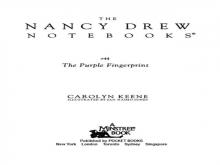 The Purple Fingerprint
The Purple Fingerprint The Picture of Guilt
The Picture of Guilt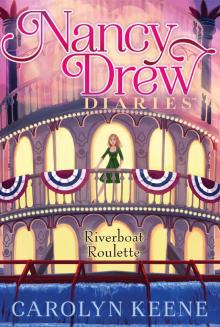 Riverboat Roulette
Riverboat Roulette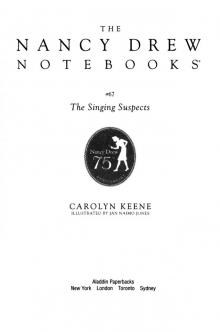 The Singing Suspects
The Singing Suspects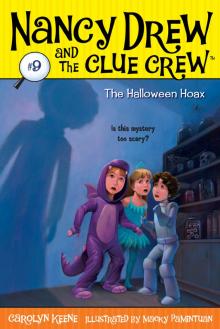 The Halloween Hoax
The Halloween Hoax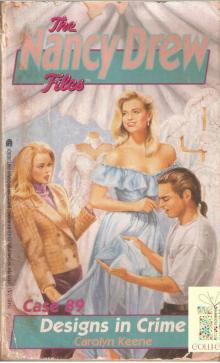 089 Designs in Crime
089 Designs in Crime The Hidden Treasures
The Hidden Treasures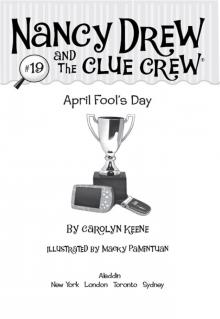 April Fool's Day
April Fool's Day The Black Widow
The Black Widow Final Notes
Final Notes The Haunting on Heliotrope Lane
The Haunting on Heliotrope Lane The Runaway Bride
The Runaway Bride The Ghost of Grey Fox Inn
The Ghost of Grey Fox Inn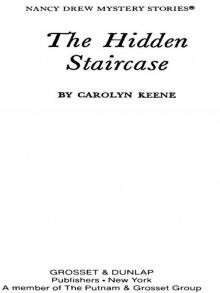 The Hidden Staircase
The Hidden Staircase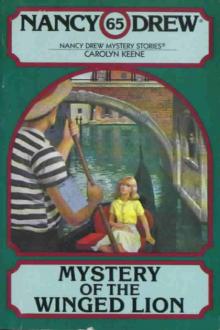 Mystery of the Winged Lion
Mystery of the Winged Lion Over the Edge
Over the Edge The Circus Scare
The Circus Scare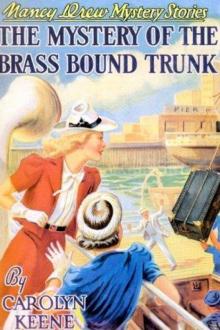 The Mystery of the Brass-Bound Trunk
The Mystery of the Brass-Bound Trunk Ski School Sneak
Ski School Sneak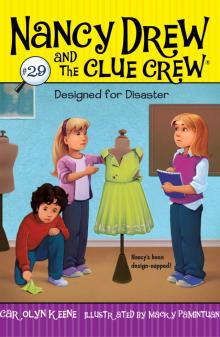 Designed for Disaster
Designed for Disaster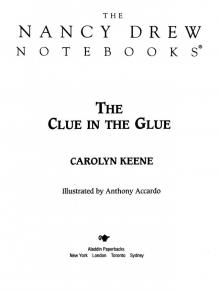 The Clue in the Glue
The Clue in the Glue Cold as Ice
Cold as Ice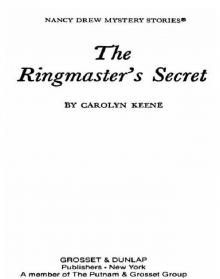 The Ringmaster's Secret
The Ringmaster's Secret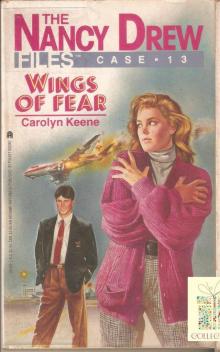 013 Wings of Fear
013 Wings of Fear The Secret of Shadow Ranch
The Secret of Shadow Ranch Not Nice on Ice
Not Nice on Ice Earth Day Escapade
Earth Day Escapade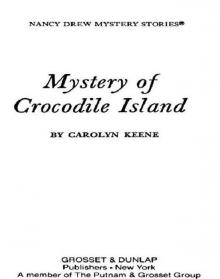 Mystery of Crocodile Island
Mystery of Crocodile Island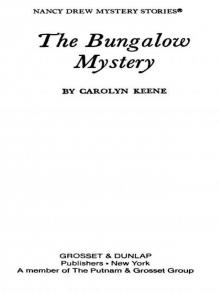 The Bungalow Mystery
The Bungalow Mystery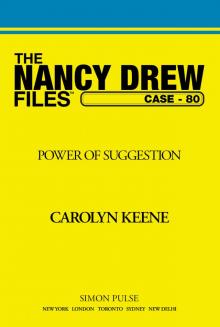 Power of Suggestion
Power of Suggestion The Lemonade Raid
The Lemonade Raid Model Crime
Model Crime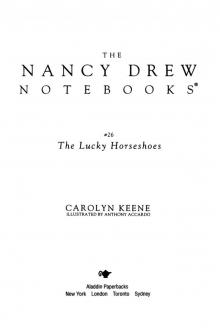 The Lucky Horseshoes
The Lucky Horseshoes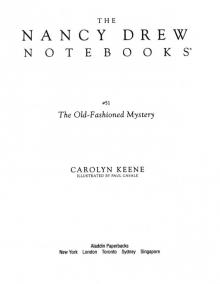 The Secret of the Old Clock
The Secret of the Old Clock The Clue at Black Creek Farm
The Clue at Black Creek Farm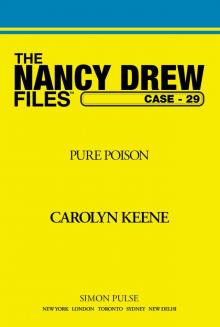 Pure Poison
Pure Poison Nobody's Business
Nobody's Business Wrong Track
Wrong Track Chick-Napped!
Chick-Napped!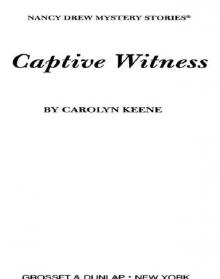 Captive Witness
Captive Witness If Looks Could Kill
If Looks Could Kill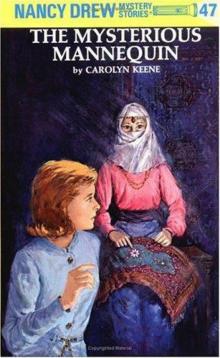 The Mysterious Mannequin
The Mysterious Mannequin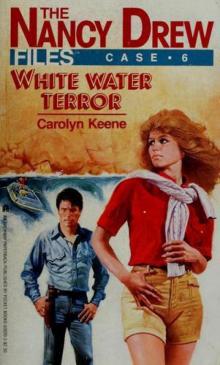 White Water Terror
White Water Terror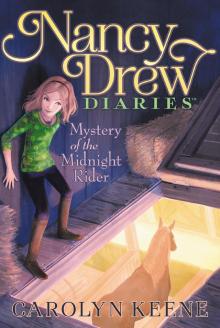 Mystery of the Midnight Rider
Mystery of the Midnight Rider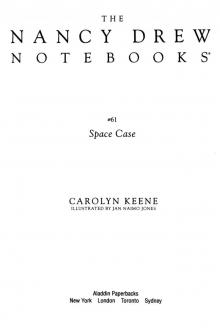 Space Case
Space Case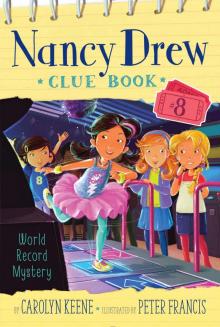 World Record Mystery
World Record Mystery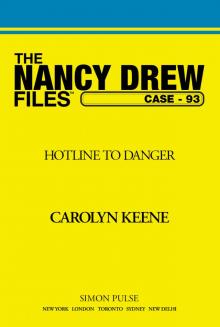 Hotline to Danger
Hotline to Danger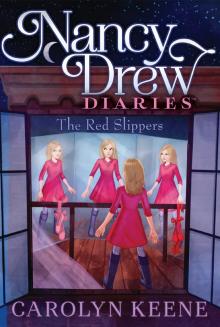 The Red Slippers
The Red Slippers A Crime for Christmas
A Crime for Christmas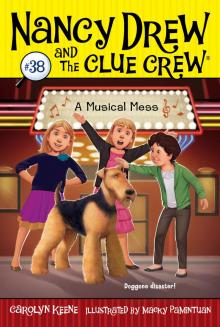 A Musical Mess
A Musical Mess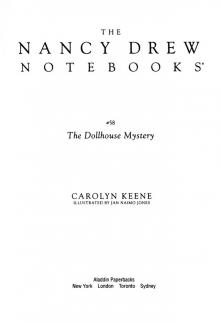 The Dollhouse Mystery
The Dollhouse Mystery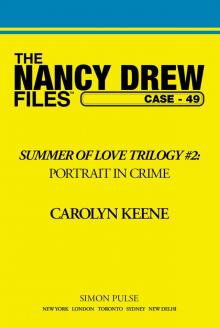 Portrait in Crime
Portrait in Crime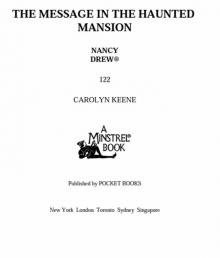 The Message in the Haunted Mansion
The Message in the Haunted Mansion Playing With Fire
Playing With Fire Mystery of the Tolling Bell
Mystery of the Tolling Bell Cutting Edge
Cutting Edge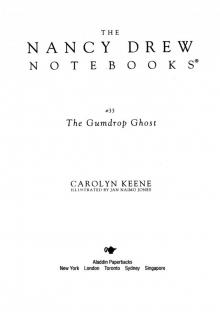 The Gumdrop Ghost
The Gumdrop Ghost The Message in the Hollow Oak
The Message in the Hollow Oak Trial by Fire
Trial by Fire Mystery at Moorsea Manor
Mystery at Moorsea Manor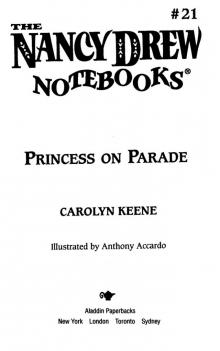 Princess on Parade
Princess on Parade The Flying Saucer Mystery
The Flying Saucer Mystery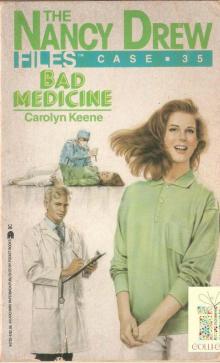 035 Bad Medicine
035 Bad Medicine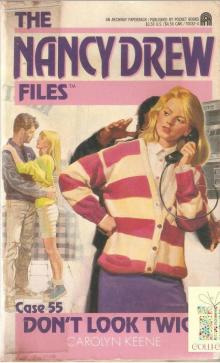 055 Don't Look Twice
055 Don't Look Twice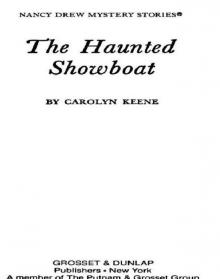 The Haunted Showboat
The Haunted Showboat Out of Bounds
Out of Bounds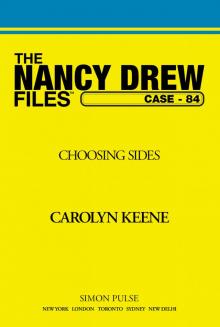 Choosing Sides
Choosing Sides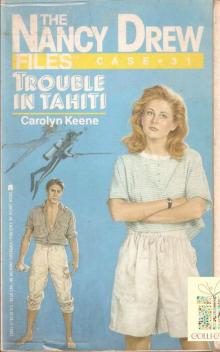 031 Trouble in Tahiti
031 Trouble in Tahiti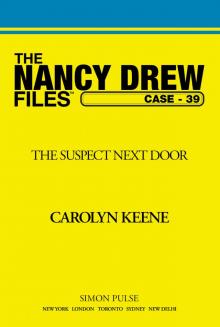 The Suspect Next Door
The Suspect Next Door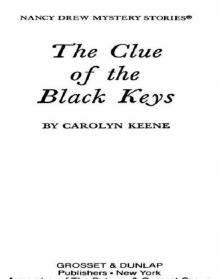 The Clue of the Black Keys
The Clue of the Black Keys The Secret Santa
The Secret Santa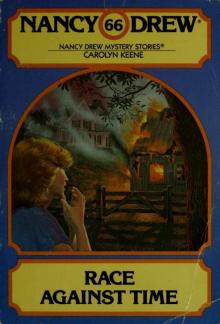 Race Against Time
Race Against Time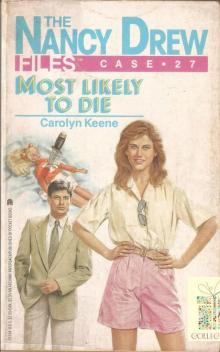 027 Most Likely to Die
027 Most Likely to Die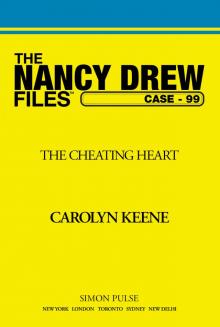 The Cheating Heart
The Cheating Heart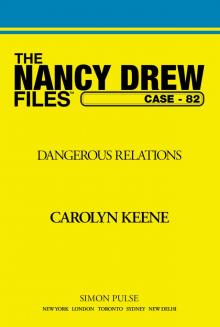 Dangerous Relations
Dangerous Relations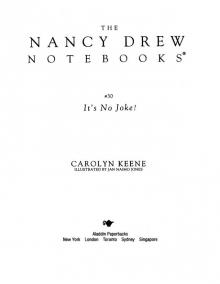 It's No Joke!
It's No Joke!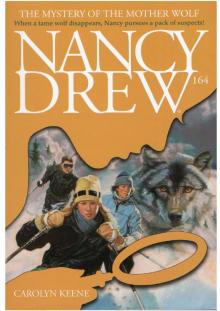 The Mystery of the Mother Wolf
The Mystery of the Mother Wolf 097 Squeeze Play
097 Squeeze Play Secret at Mystic Lake
Secret at Mystic Lake The Double Jinx Mystery
The Double Jinx Mystery The Walkie Talkie Mystery
The Walkie Talkie Mystery The Case of the Vanishing Veil
The Case of the Vanishing Veil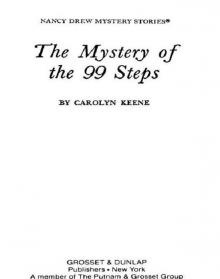 The Mystery of the 99 Steps
The Mystery of the 99 Steps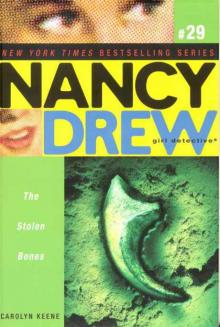 The Stolen Bones
The Stolen Bones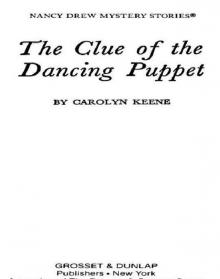 The Clue of the Dancing Puppet
The Clue of the Dancing Puppet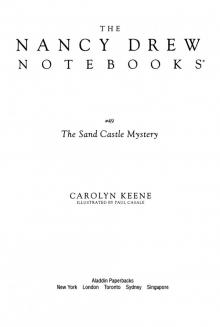 The Sand Castle Mystery
The Sand Castle Mystery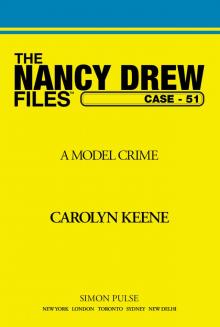 A Model Crime
A Model Crime The Witch Tree Symbol
The Witch Tree Symbol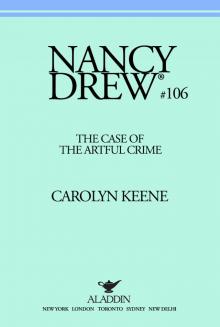 The Case of the Artful Crime
The Case of the Artful Crime Mall Madness
Mall Madness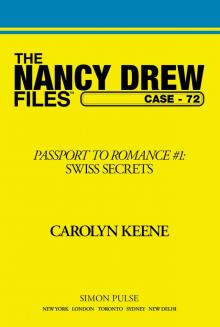 Swiss Secrets
Swiss Secrets The Magician's Secret
The Magician's Secret Tall, Dark and Deadly
Tall, Dark and Deadly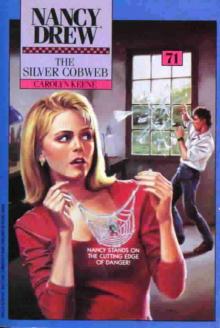 The Silver Cobweb
The Silver Cobweb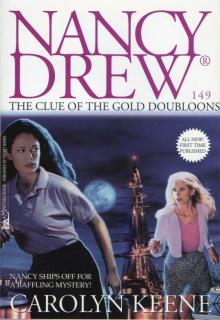 The Clue of the Gold Doubloons
The Clue of the Gold Doubloons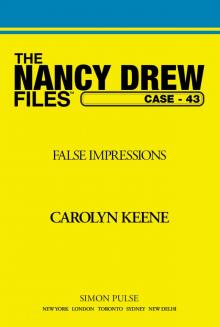 False Impressions
False Impressions Model Suspect
Model Suspect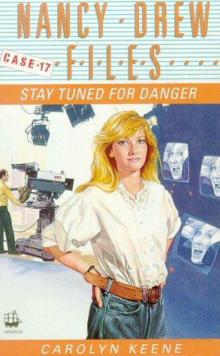 Stay Tuned for Danger
Stay Tuned for Danger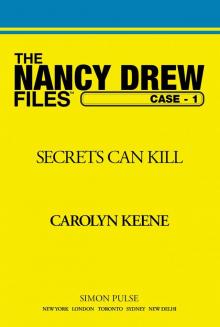 Secrets Can Kill
Secrets Can Kill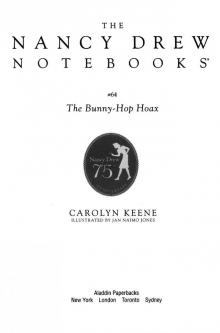 The Bunny-Hop Hoax
The Bunny-Hop Hoax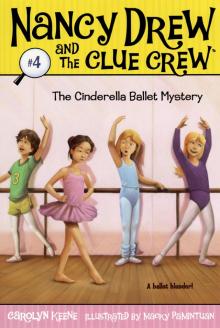 The Cinderella Ballet Mystery
The Cinderella Ballet Mystery The Secret at Solaire
The Secret at Solaire Trash or Treasure?
Trash or Treasure? The Missing Horse Mystery
The Missing Horse Mystery The Lost Locket
The Lost Locket The Secret of the Wooden Lady
The Secret of the Wooden Lady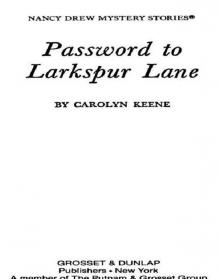 Password to Larkspur Lane
Password to Larkspur Lane Movie Madness
Movie Madness A Secret in Time
A Secret in Time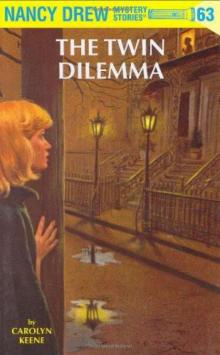 The Twin Dilemma
The Twin Dilemma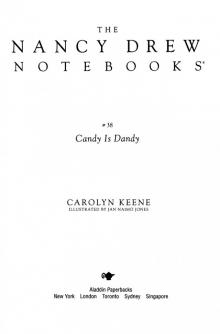 Candy Is Dandy
Candy Is Dandy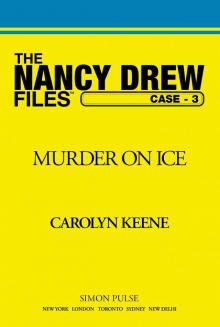 Murder on Ice
Murder on Ice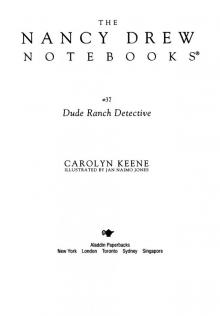 Dude Ranch Detective
Dude Ranch Detective The Slumber Party Secret
The Slumber Party Secret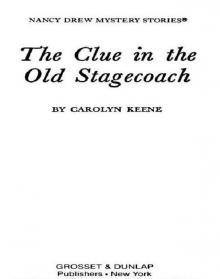 The Clue in the Old Stagecoach
The Clue in the Old Stagecoach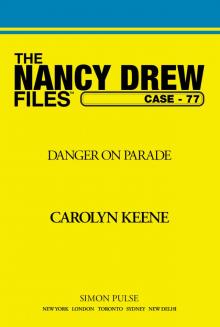 Danger on Parade
Danger on Parade Big Top Flop
Big Top Flop Strangers on a Train
Strangers on a Train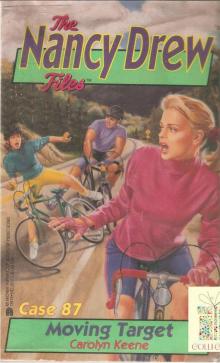 087 Moving Target
087 Moving Target The Scarytales Sleepover
The Scarytales Sleepover The Mystery of the Fire Dragon
The Mystery of the Fire Dragon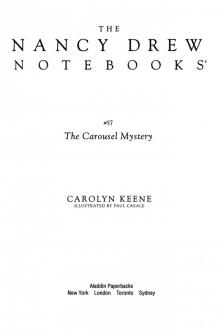 The Carousel Mystery
The Carousel Mystery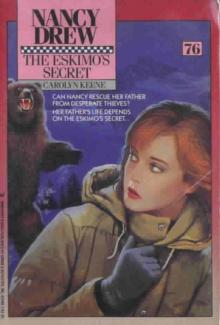 The Eskimo's Secret
The Eskimo's Secret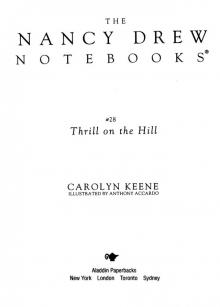 Thrill on the Hill
Thrill on the Hill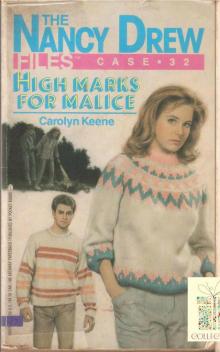 032 High Marks for Malice
032 High Marks for Malice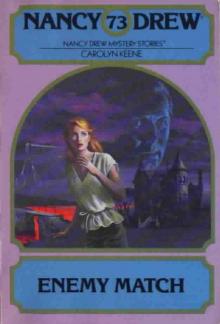 Enemy Match
Enemy Match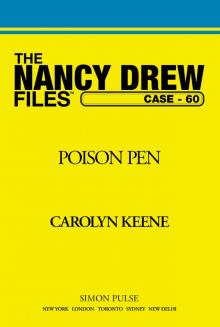 Poison Pen
Poison Pen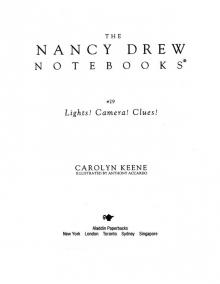 Lights, Camera . . . Cats!
Lights, Camera . . . Cats! Lost in the Everglades
Lost in the Everglades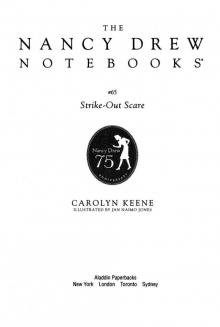 Strike-Out Scare
Strike-Out Scare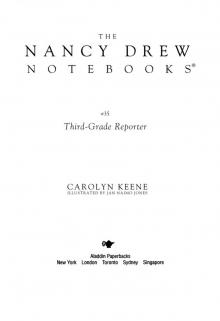 Third-Grade Reporter
Third-Grade Reporter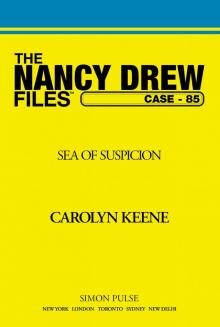 Sea of Suspicion
Sea of Suspicion Wedding Day Disaster
Wedding Day Disaster The Make-A-Pet Mystery
The Make-A-Pet Mystery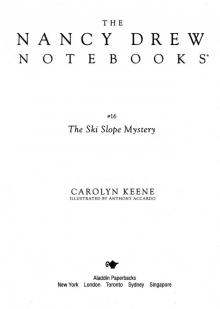 The Ski Slope Mystery
The Ski Slope Mystery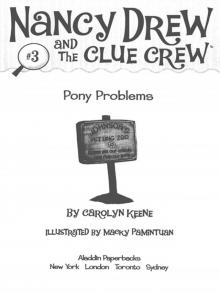 Pony Problems
Pony Problems Candy Kingdom Chaos
Candy Kingdom Chaos The Sign in the Smoke
The Sign in the Smoke The Wrong Chemistry
The Wrong Chemistry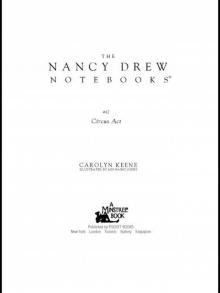 Circus Act
Circus Act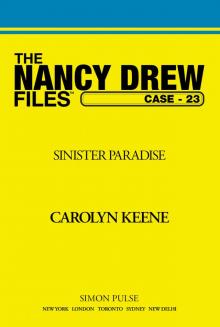 Sinister Paradise
Sinister Paradise This Side of Evil
This Side of Evil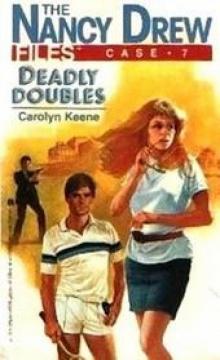 Deadly Doubles
Deadly Doubles The Mystery of the Masked Rider
The Mystery of the Masked Rider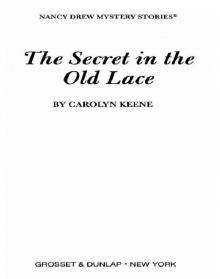 The Secret in the Old Lace
The Secret in the Old Lace The Pen Pal Puzzle
The Pen Pal Puzzle Without a Trace
Without a Trace Whose Pet Is Best?
Whose Pet Is Best?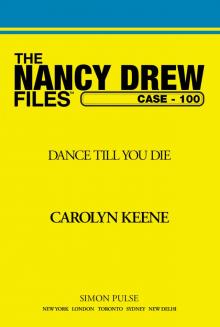 Dance Till You Die
Dance Till You Die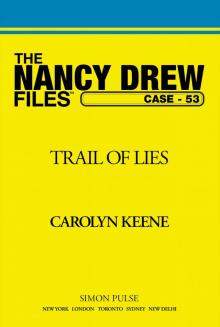 Trail of Lies
Trail of Lies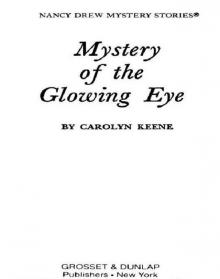 Mystery of the Glowing Eye
Mystery of the Glowing Eye The Clue of the Leaning Chimney
The Clue of the Leaning Chimney The Crook Who Took the Book
The Crook Who Took the Book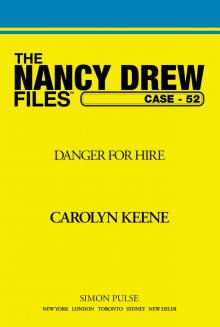 Danger for Hire
Danger for Hire Thanksgiving Thief
Thanksgiving Thief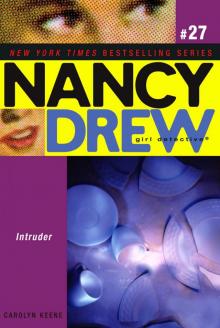 Intruder!
Intruder! The Hidden Window Mystery
The Hidden Window Mystery Win, Place or Die
Win, Place or Die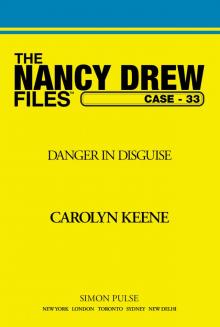 Danger in Disguise
Danger in Disguise The Best Detective
The Best Detective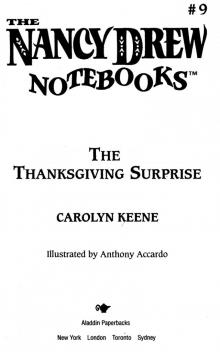 The Thanksgiving Surprise
The Thanksgiving Surprise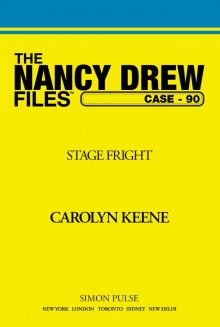 Stage Fright
Stage Fright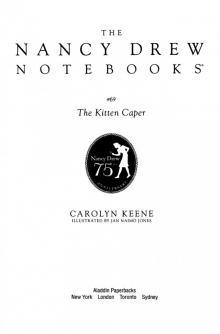 The Kitten Caper
The Kitten Caper Stolen Affections
Stolen Affections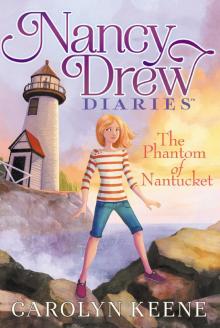 The Phantom of Nantucket
The Phantom of Nantucket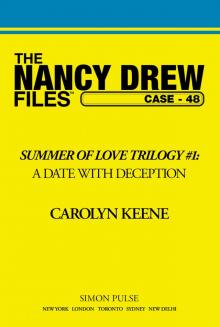 Date With Deception
Date With Deception Cooking Camp Disaster
Cooking Camp Disaster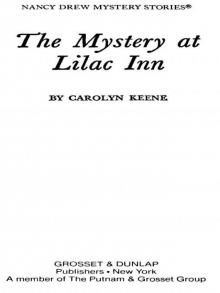 The Mystery at Lilac Inn
The Mystery at Lilac Inn Springtime Crime
Springtime Crime Action!
Action! Into Thin Air
Into Thin Air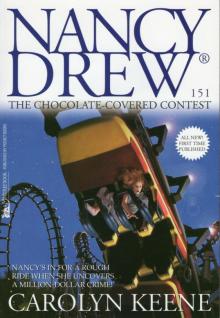 The Chocolate-Covered Contest
The Chocolate-Covered Contest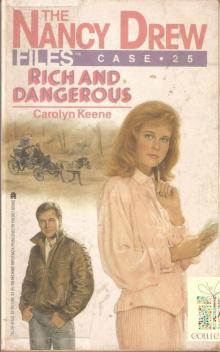 025 Rich and Dangerous
025 Rich and Dangerous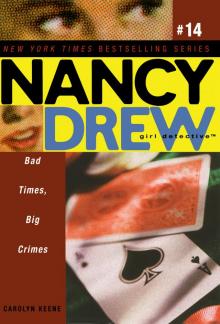 Bad Times, Big Crimes
Bad Times, Big Crimes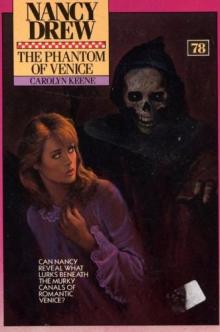 078 The Phantom Of Venice
078 The Phantom Of Venice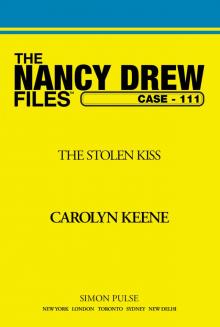 The Stolen Kiss
The Stolen Kiss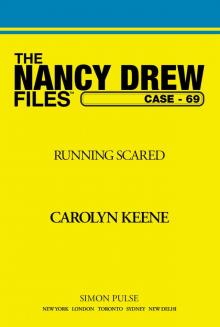 Running Scared
Running Scared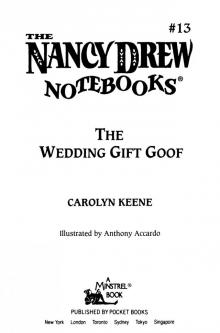 The Wedding Gift Goof
The Wedding Gift Goof Time Thief
Time Thief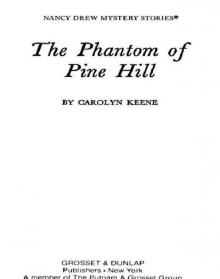 The Phantom of Pine Hill
The Phantom of Pine Hill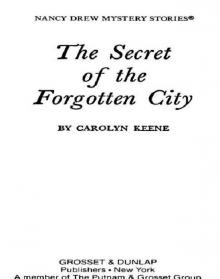 The Secret of the Forgotten City
The Secret of the Forgotten City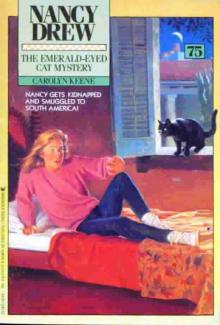 The Emerald-Eyed Cat Mystery
The Emerald-Eyed Cat Mystery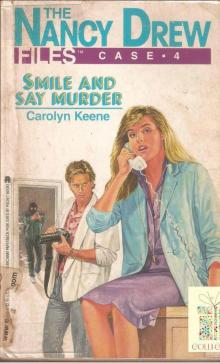 004 Smile and Say Murder
004 Smile and Say Murder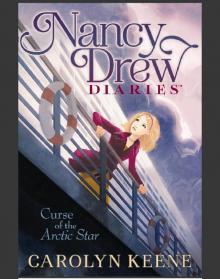 Curse of the Arctic Star
Curse of the Arctic Star Dinosaur Alert!
Dinosaur Alert!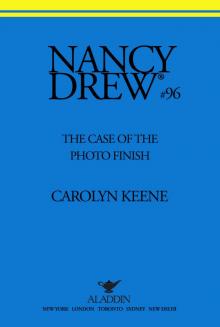 The Case of the Photo Finish
The Case of the Photo Finish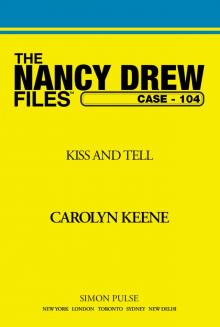 Kiss and Tell
Kiss and Tell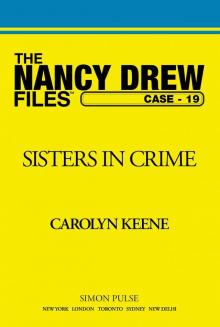 Sisters in Crime
Sisters in Crime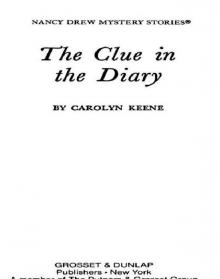 The Clue in the Diary
The Clue in the Diary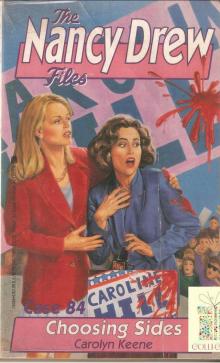 084 Choosing Sides
084 Choosing Sides Haunting of Horse Island
Haunting of Horse Island Vanishing Act
Vanishing Act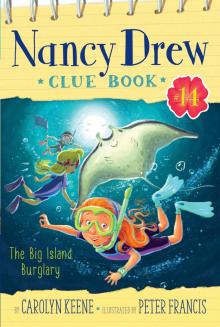 The Big Island Burglary
The Big Island Burglary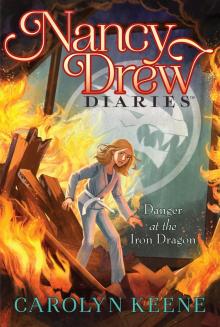 Danger at the Iron Dragon
Danger at the Iron Dragon Pets on Parade
Pets on Parade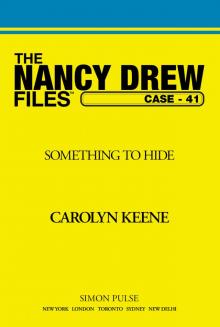 Something to Hide
Something to Hide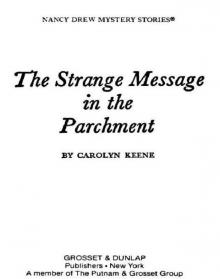 The Strange Message in the Parchment
The Strange Message in the Parchment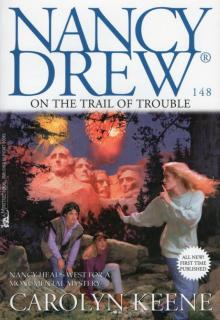 On the Trail of Trouble
On the Trail of Trouble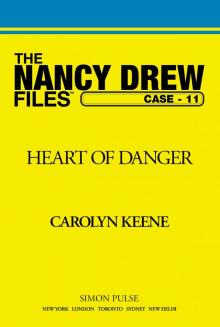 Heart of Danger
Heart of Danger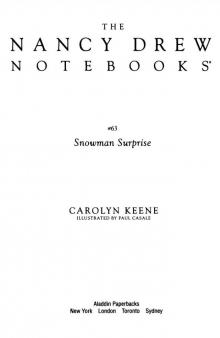 The Snowman Surprise
The Snowman Surprise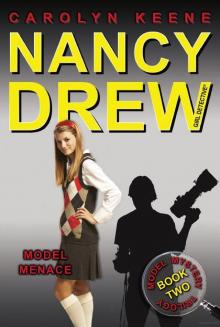 Model Menace
Model Menace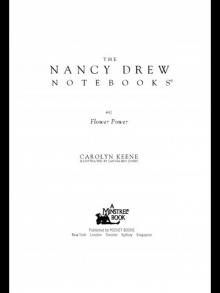 Flower Power
Flower Power The Great Goat Gaffe
The Great Goat Gaffe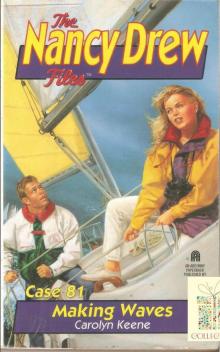 081 Making Waves
081 Making Waves Famous Mistakes
Famous Mistakes The Fashion Disaster
The Fashion Disaster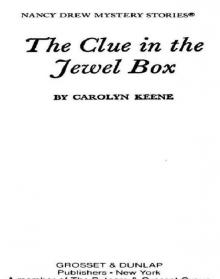 The Clue in the Jewel Box
The Clue in the Jewel Box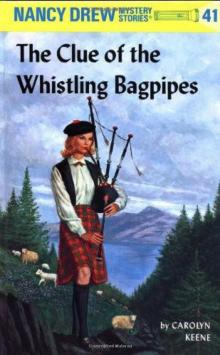 The Clue of the Whistling Bagpipes
The Clue of the Whistling Bagpipes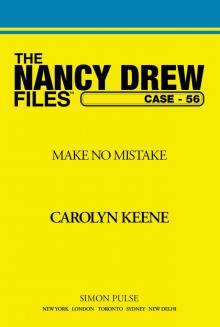 Make No Mistake
Make No Mistake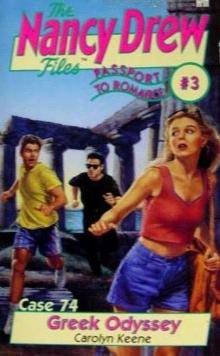 Greek Odyssey
Greek Odyssey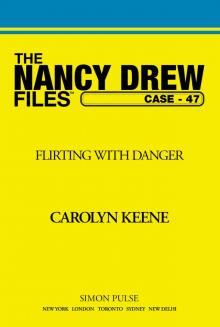 Flirting With Danger
Flirting With Danger Double Take
Double Take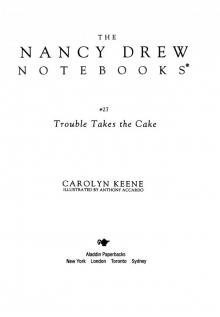 Trouble Takes the Cake
Trouble Takes the Cake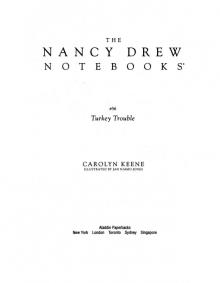 Turkey Trouble
Turkey Trouble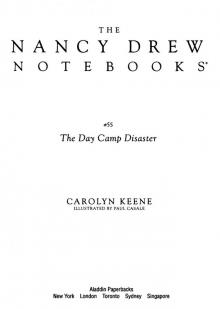 The Day Camp Disaster
The Day Camp Disaster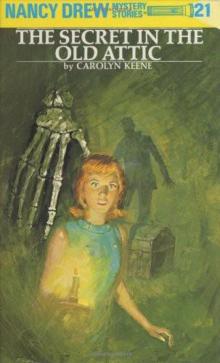 The Secret in the Old Attic
The Secret in the Old Attic The Baby-Sitter Burglaries
The Baby-Sitter Burglaries Recipe for Murder
Recipe for Murder The Secret of the Scarecrow
The Secret of the Scarecrow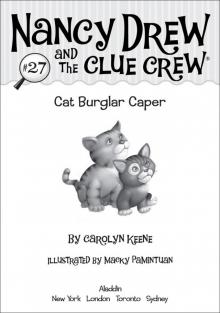 Cat Burglar Caper
Cat Burglar Caper Turkey Trot Plot
Turkey Trot Plot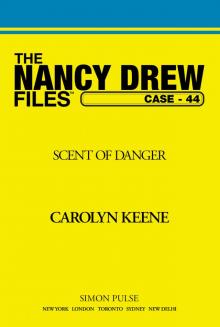 Scent of Danger
Scent of Danger The Clue in the Crossword Cipher
The Clue in the Crossword Cipher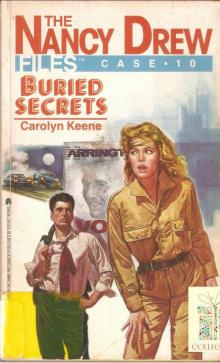 010 Buried Secrets
010 Buried Secrets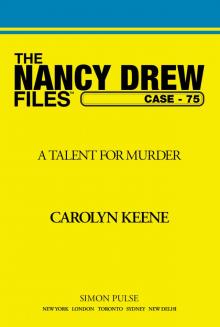 A Talent for Murder
A Talent for Murder The Triple Hoax
The Triple Hoax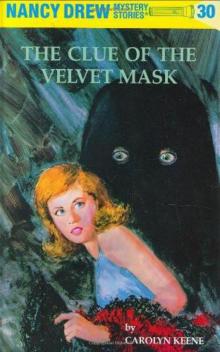 The Clue of the Velvet Mask
The Clue of the Velvet Mask Last Lemonade Standing
Last Lemonade Standing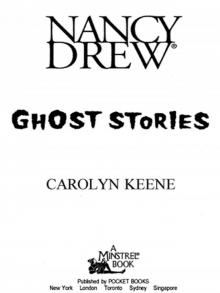 The Ghost of Blackwood Hall
The Ghost of Blackwood Hall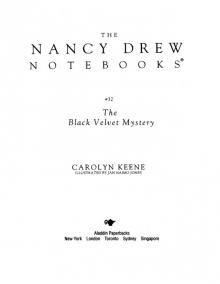 The Black Velvet Mystery
The Black Velvet Mystery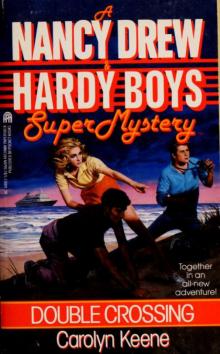 Double Crossing
Double Crossing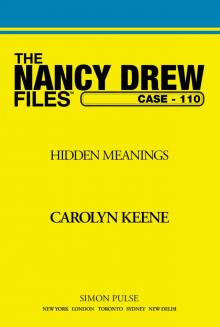 Hidden Meanings
Hidden Meanings Trouble at Camp Treehouse
Trouble at Camp Treehouse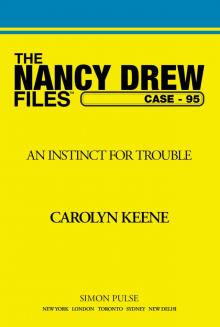 An Instinct for Trouble
An Instinct for Trouble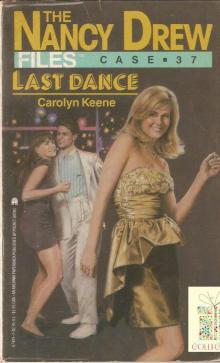 037 Last Dance
037 Last Dance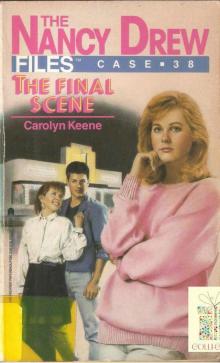 038 The Final Scene
038 The Final Scene Duck Derby Debacle
Duck Derby Debacle The Pumpkin Patch Puzzle
The Pumpkin Patch Puzzle Hidden Pictures
Hidden Pictures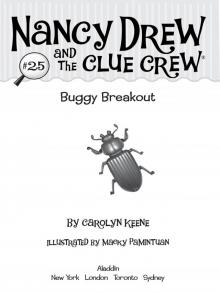 Buggy Breakout
Buggy Breakout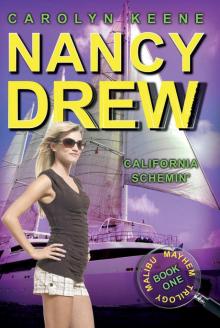 California Schemin'
California Schemin'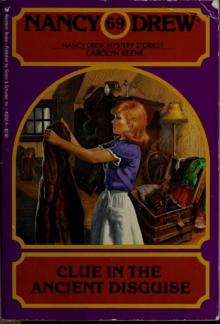 Clue in the Ancient Disguise
Clue in the Ancient Disguise Case of the Sneaky Snowman
Case of the Sneaky Snowman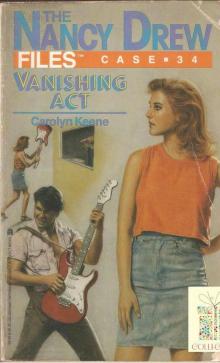 034 Vanishing Act
034 Vanishing Act A Script for Danger
A Script for Danger The Flower Show Fiasco
The Flower Show Fiasco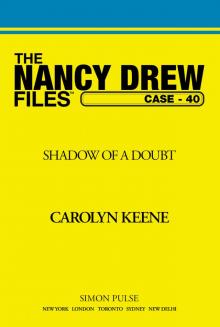 Shadow of a Doubt
Shadow of a Doubt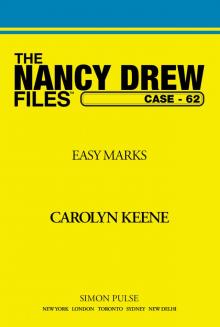 Easy Marks
Easy Marks Alien in the Classroom
Alien in the Classroom Ghost Stories, #2 (Nancy Drew)
Ghost Stories, #2 (Nancy Drew)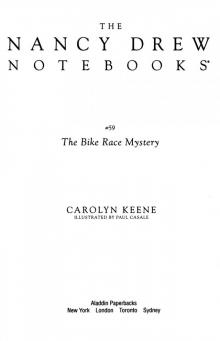 The Bike Race Mystery
The Bike Race Mystery False Pretenses
False Pretenses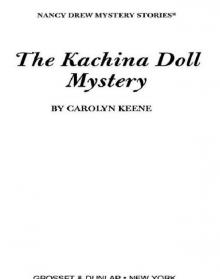 The Kachina Doll Mystery
The Kachina Doll Mystery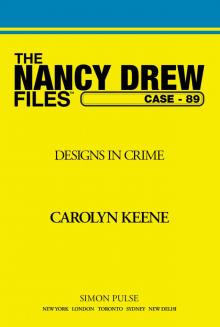 Designs in Crime
Designs in Crime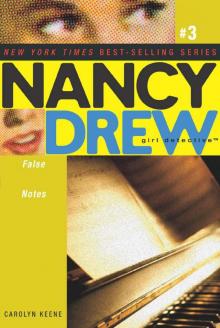 False Notes
False Notes The Haunted Carousel
The Haunted Carousel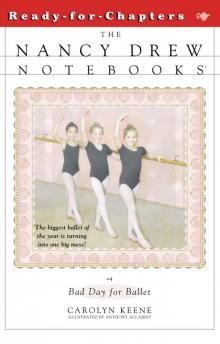 Bad Day for Ballet
Bad Day for Ballet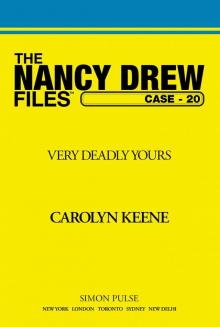 Very Deadly Yours
Very Deadly Yours The Fine-Feathered Mystery
The Fine-Feathered Mystery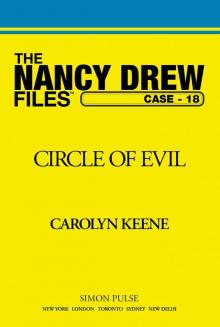 Circle of Evil
Circle of Evil The Crooked Banister
The Crooked Banister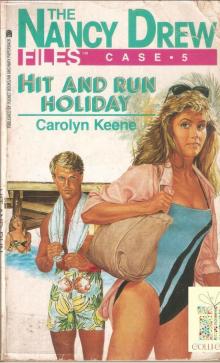 005 Hit and Run Holiday
005 Hit and Run Holiday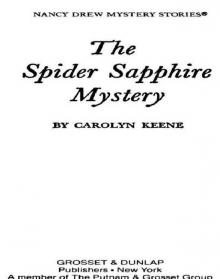 The Spider Sapphire Mystery
The Spider Sapphire Mystery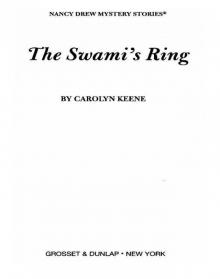 The Swami's Ring
The Swami's Ring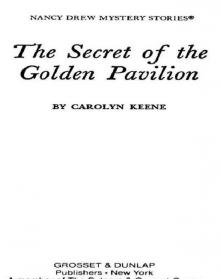 The Secret of the Golden Pavilion
The Secret of the Golden Pavilion Recipe for Trouble
Recipe for Trouble Betrayed by Love
Betrayed by Love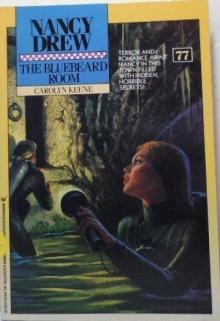 The Bluebeard Room
The Bluebeard Room Sweet Revenge
Sweet Revenge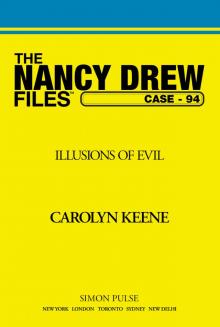 Illusions of Evil
Illusions of Evil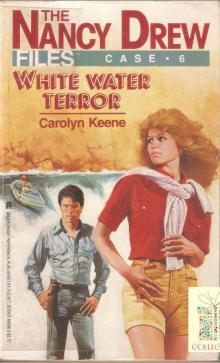 006 White Water Terror
006 White Water Terror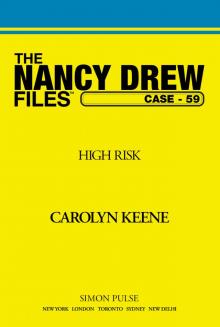 High Risk
High Risk Sleepover Sleuths
Sleepover Sleuths The Clue on the Crystal Dove
The Clue on the Crystal Dove The Stolen Unicorn
The Stolen Unicorn The Professor and the Puzzle
The Professor and the Puzzle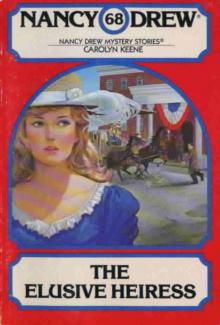 The Elusive Heiress
The Elusive Heiress Stalk, Don't Run
Stalk, Don't Run The Mystery at the Moss-Covered Mansion
The Mystery at the Moss-Covered Mansion The Tortoise and the Scare
The Tortoise and the Scare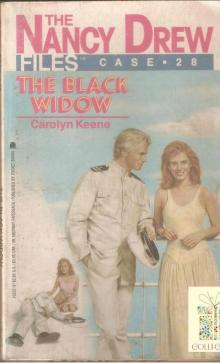 028 The Black Widow
028 The Black Widow Big Worry in Wonderland
Big Worry in Wonderland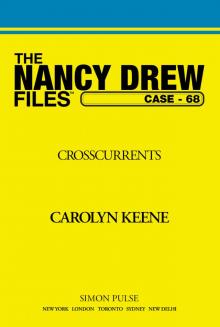 Crosscurrents
Crosscurrents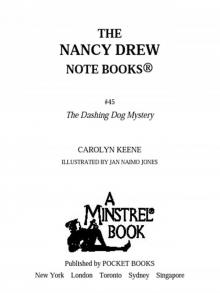 The Dashing Dog Mystery
The Dashing Dog Mystery Fatal Attraction
Fatal Attraction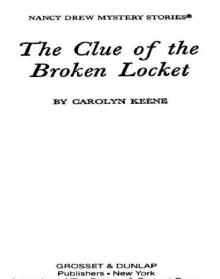 The Clue of the Broken Locket
The Clue of the Broken Locket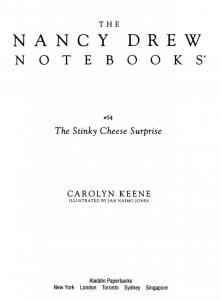 The Stinky Cheese Surprise
The Stinky Cheese Surprise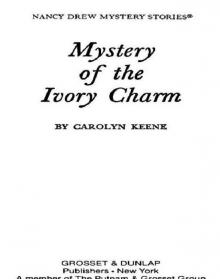 Mystery of the Ivory Charm
Mystery of the Ivory Charm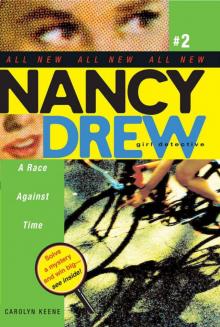 A Race Against Time
A Race Against Time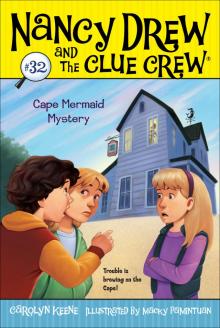 Cape Mermaid Mystery
Cape Mermaid Mystery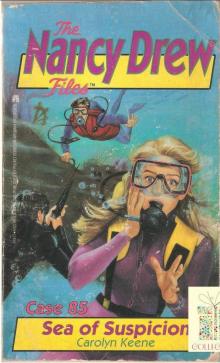 085 Sea of Suspicion
085 Sea of Suspicion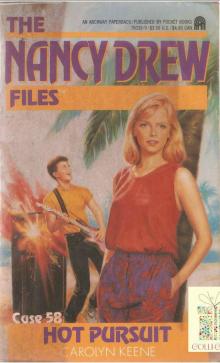 058 Hot Pursuit
058 Hot Pursuit The Secret in the Spooky Woods
The Secret in the Spooky Woods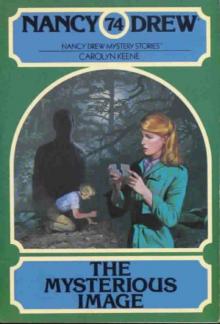 The Mysterious Image
The Mysterious Image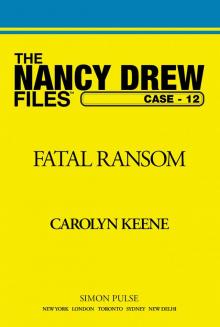 Fatal Ransom
Fatal Ransom The Stolen Show
The Stolen Show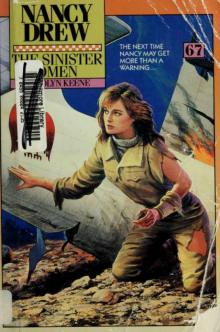 The Sinister Omen
The Sinister Omen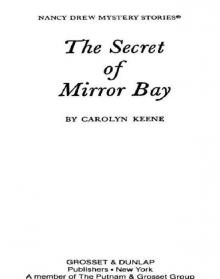 The Secret of Mirror Bay
The Secret of Mirror Bay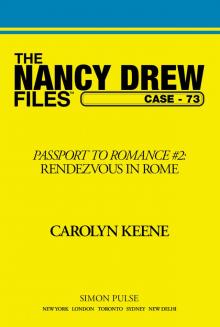 Rendezvous in Rome
Rendezvous in Rome The Perfect Plot
The Perfect Plot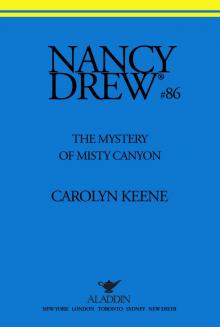 The Mystery of Misty Canyon
The Mystery of Misty Canyon Nancy's Mysterious Letter
Nancy's Mysterious Letter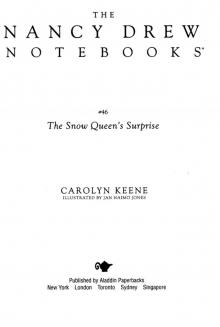 The Snow Queen's Surprise
The Snow Queen's Surprise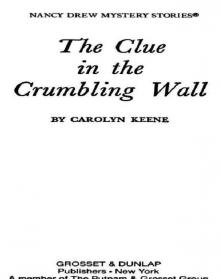 The Clue in the Crumbling Wall
The Clue in the Crumbling Wall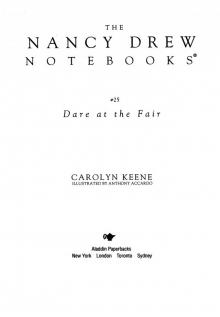 Dare at the Fair
Dare at the Fair Scream for Ice Cream
Scream for Ice Cream A Star Witness
A Star Witness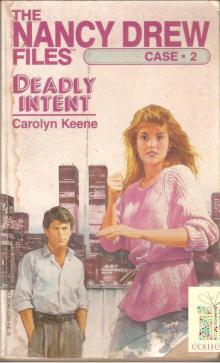 002 Deadly Intent
002 Deadly Intent Museum Mayhem
Museum Mayhem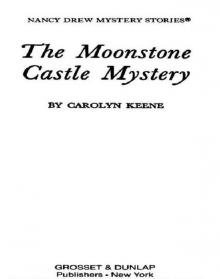 The Moonstone Castle Mystery
The Moonstone Castle Mystery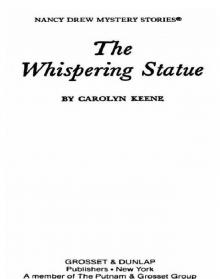 The Whispering Statue
The Whispering Statue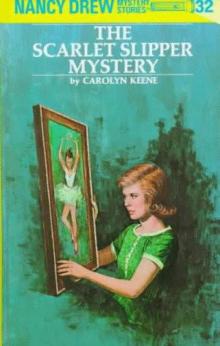 The Scarlet Slipper Mystery
The Scarlet Slipper Mystery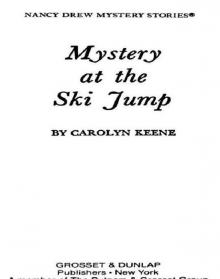 Mystery at the Ski Jump
Mystery at the Ski Jump Hot Pursuit
Hot Pursuit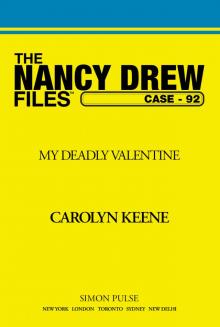 My Deadly Valentine
My Deadly Valentine The Silent Suspect
The Silent Suspect Deep Secrets
Deep Secrets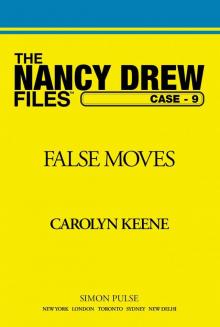 False Moves
False Moves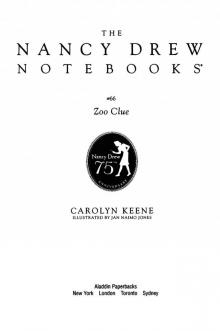 The Zoo Crew
The Zoo Crew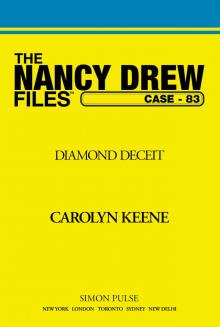 Diamond Deceit
Diamond Deceit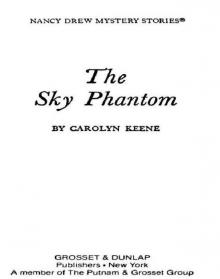 The Sky Phantom
The Sky Phantom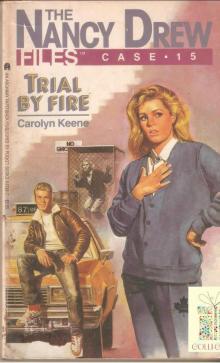 015 Trial by Fire
015 Trial by Fire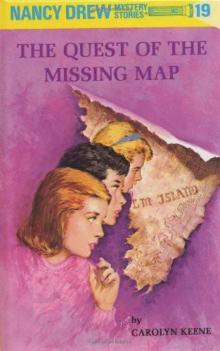 The Quest of the Missing Map
The Quest of the Missing Map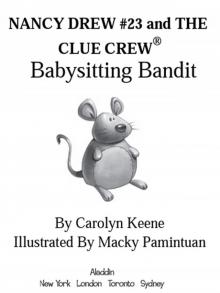 Babysitting Bandit
Babysitting Bandit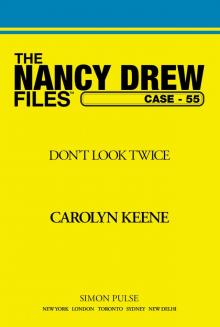 Don't Look Twice
Don't Look Twice Never Say Die
Never Say Die The Soccer Shoe Clue
The Soccer Shoe Clue Pool Party Puzzler
Pool Party Puzzler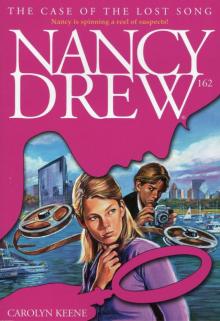 The Case of the Lost Song
The Case of the Lost Song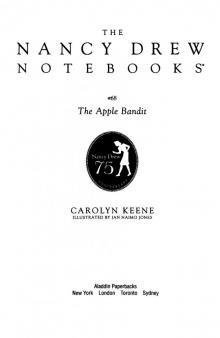 The Apple Bandit
The Apple Bandit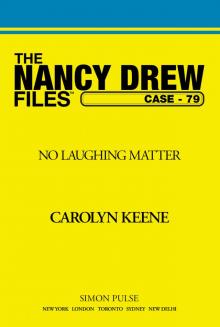 No Laughing Matter
No Laughing Matter The Thirteenth Pearl
The Thirteenth Pearl Sabotage at Willow Woods
Sabotage at Willow Woods Butterfly Blues
Butterfly Blues Model Crime 1
Model Crime 1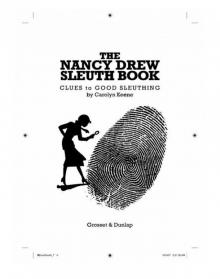 The Nancy Drew Sleuth Book
The Nancy Drew Sleuth Book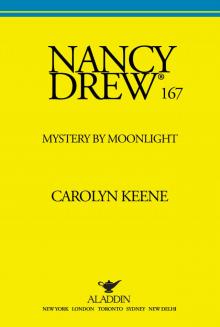 Mystery by Moonlight
Mystery by Moonlight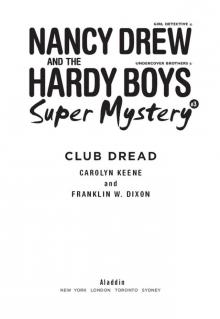 Club Dread
Club Dread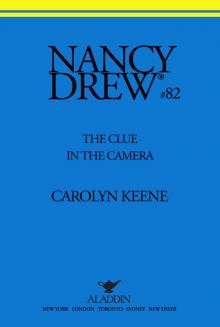 The Clue in the Camera
The Clue in the Camera 118 Betrayed By Love
118 Betrayed By Love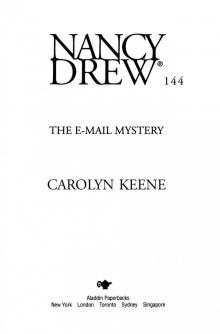 The E-Mail Mystery (Nancy Drew Book 144)
The E-Mail Mystery (Nancy Drew Book 144)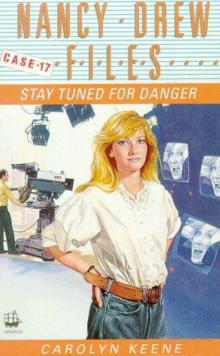 Stay Tuned for Danger: Circle of Evil
Stay Tuned for Danger: Circle of Evil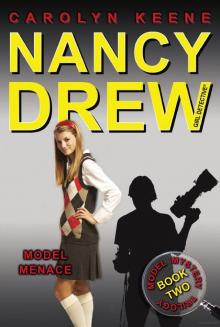 Model Menace 2
Model Menace 2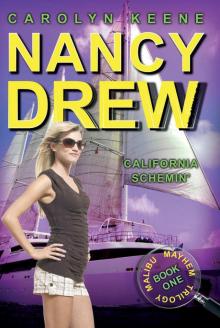 California Schemin': Book One in the Malibu Mayhem Trilogy
California Schemin': Book One in the Malibu Mayhem Trilogy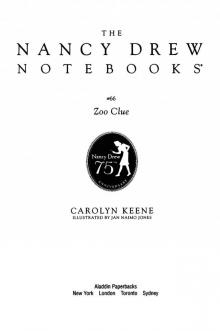 Zoo Clue (Nancy Drew Notebooks)
Zoo Clue (Nancy Drew Notebooks)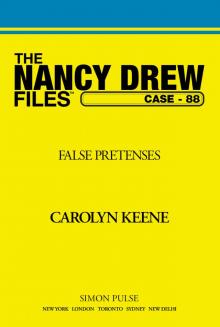 False Pretences
False Pretences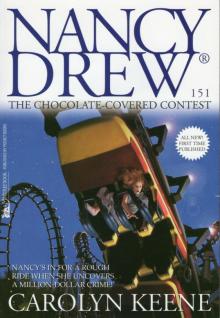 151 The Chocolate-Covered Contest
151 The Chocolate-Covered Contest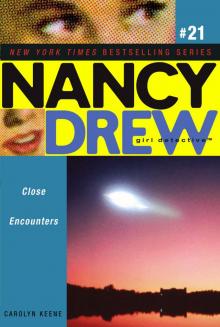 Close Encounters
Close Encounters The Emeral-Eyed Cat Mystery
The Emeral-Eyed Cat Mystery Boo Crew
Boo Crew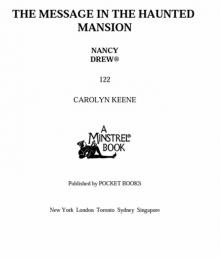 The Message in the Haunted Mansion (Nancy Drew Book 122)
The Message in the Haunted Mansion (Nancy Drew Book 122) A Nancy Drew Christmas
A Nancy Drew Christmas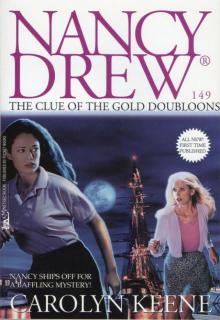 149 The Clue Of The Gold Doubloons
149 The Clue Of The Gold Doubloons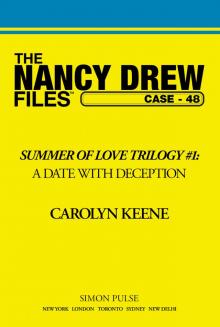 A Date with Deception
A Date with Deception 101 The Picture of Guilt
101 The Picture of Guilt The Secret in the Spooky Woods (Nancy Drew Notebooks Book 62)
The Secret in the Spooky Woods (Nancy Drew Notebooks Book 62) The Wrong Track
The Wrong Track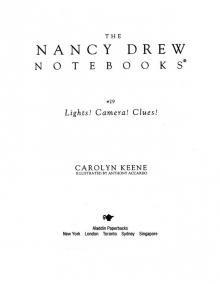 Lights! Camera! Clues!
Lights! Camera! Clues! The Vanishing Act
The Vanishing Act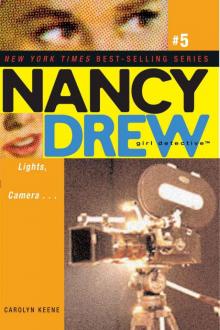 Lights, Camera . . .
Lights, Camera . . . Model Suspect 3
Model Suspect 3 160 The Clue On The Crystal Dove
160 The Clue On The Crystal Dove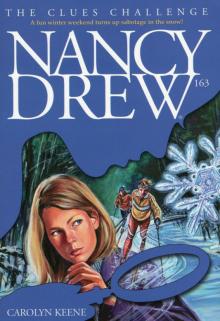 163 The Clues Challenge
163 The Clues Challenge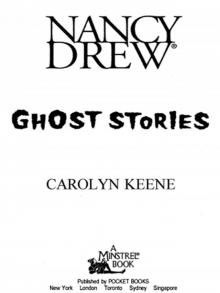 Ghost Stories (Nancy Drew)
Ghost Stories (Nancy Drew)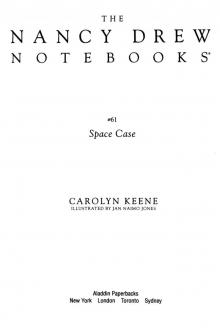 Space Case (Nancy Drew Notebooks Book 61)
Space Case (Nancy Drew Notebooks Book 61)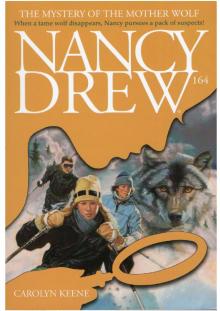 164 The Mystery Of The Mother Wolf
164 The Mystery Of The Mother Wolf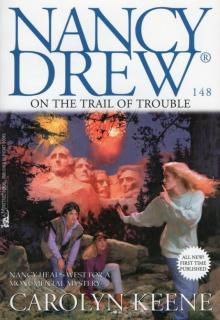 148 On The Trail Of Trouble
148 On The Trail Of Trouble The Walkie-Talkie Mystery
The Walkie-Talkie Mystery The E-Mail Mystery
The E-Mail Mystery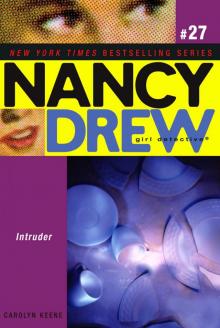 Intruder (Nancy Drew (All New) Girl Detective)
Intruder (Nancy Drew (All New) Girl Detective)![The Stolen Relic [Nancy Drew Girl Detective 007] Read online](http://i1.bookreadfree.com/i2/04/11/the_stolen_relic_nancy_drew_girl_detective_007_preview.jpg) The Stolen Relic [Nancy Drew Girl Detective 007]
The Stolen Relic [Nancy Drew Girl Detective 007] 105 Stolen Affections
105 Stolen Affections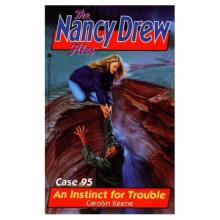 An Instict for Trouble
An Instict for Trouble 161 Lost In The Everglades
161 Lost In The Everglades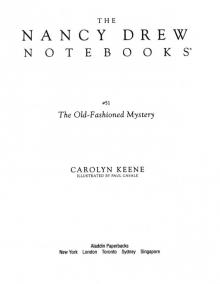 The Old-Fashioned Mystery
The Old-Fashioned Mystery Perfect Plot
Perfect Plot